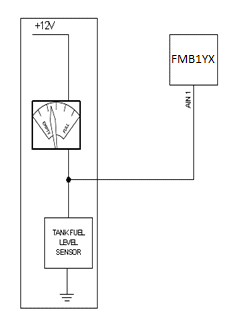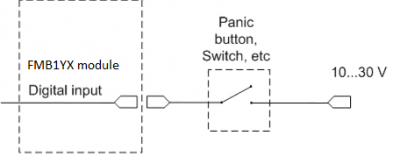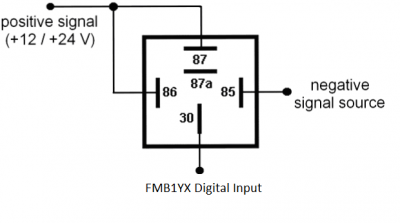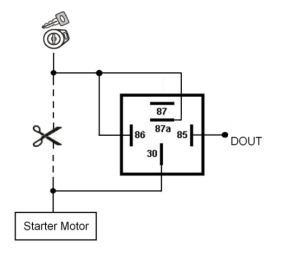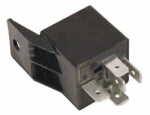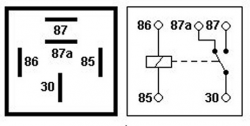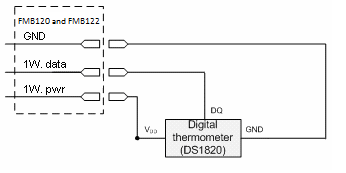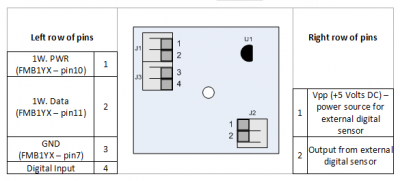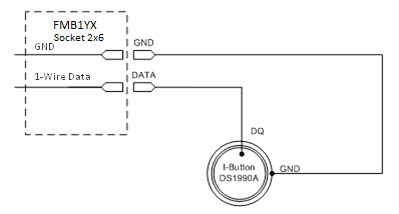Difference between revisions of "Template:FMB1 Accessories"
From Wiki Knowledge Base | Teltonika GPS
Atabasnikov (talk | contribs) m |
m |
||
| (22 intermediate revisions by 5 users not shown) | |||
| Line 1: | Line 1: | ||
| − | {| class=" | + | |
| + | {| class="nd-othertables_2" style="border-style: solid; border-width: 0px" | ||
|+ | |+ | ||
| − | |||
| − | |||
|- | |- | ||
| − | + | | style="text-align: left;" |[[Image:Bw_nb.png|50px]] | |
| − | + | | style="text-align: left;" |Please order accessories separately as they are not included into device package. | |
|- | |- | ||
| − | | style="text-align: left; vertical-align: top;" | + | |} |
| − | | style="text-align: left; vertical-align: top;" | [[Image: | + | |
| + | {| class="nd-othertables_2" | ||
| + | |+ | ||
| + | ! style="width: 300px; color: white;" |Accessory and its description | ||
| + | ! style="width: 500px; color: white;" |Accessory connection schematic | ||
| + | |- | ||
| + | |||
| + | ! style="text-align: left; vertical-align: top;" |Fuel tank sensors | ||
| + | ! style="text-align: center; vertical-align: top;" |Fuel sensor connection to {{{model|FMB1YX}}} | ||
| + | |- | ||
| + | | style="text-align: left; vertical-align: top;" |A fuel tank level sensor that indicates the approximate fuel level on the driver's indicator panel exists in most cars. If the sensor returns an analog signal proportional to fuel level it can be connected to {{{model|FMB1YX}}} Analog input. After connection to the tank fuel level sensor, a calibration is needed because most fuel tank sensors are not linear. Calibration is performed by measuring voltage values resulting from the volume of fuel in the tank. | ||
| + | | style="text-align: left; vertical-align: top;" |[[Image:Sch_fmb1yx_lls.png|250px|center]] | ||
| + | |- | ||
| + | ! style="text-align: left; vertical-align: top;" |Alarm buttons, door sensors etc. | ||
| + | ! style="text-align: center; vertical-align: top;" |Panic button connection to {{{model|FMB1YX}}} | ||
|- | |- | ||
| − | | style="text-align: left; vertical-align: top;" | | + | | style="text-align: left; vertical-align: top;" |Alarm buttons, door sensors, ignition, etc. have two output states: high or low. {{{model|FMB1YX}}} Digital inputs are used to detect these states. |
| + | | style="text-align: left; vertical-align: top;" |[[Image:Sch_fmb1yx_panic.png|400px|center]] | ||
|- | |- | ||
| − | ! style="text-align: left; vertical-align: top;" | | + | ! style="text-align: left; vertical-align: top;" |Relays |
| + | ! style="text-align: center; vertical-align: top;" |Inverting relay connection to {{{model|FMB1YX}}} | ||
|- | |- | ||
| − | | style="text-align: left; vertical-align: top;" | | + | | style="text-align: left; vertical-align: top;" |In cases when the sensor output signal is negative, an additional relay has to be installed to convert the negative signal to positive. |
| + | | style="text-align: left; vertical-align: top;" |[[Image:Sch_fmb1yx_inv_relay.png|400px|center]] | ||
|- | |- | ||
| − | ! style="text-align: left; vertical-align: top;" | | + | ! style="text-align: left; vertical-align: top;" |Immobilizer relay |
| − | ! style="text-align: | + | ! style="text-align: center; vertical-align: top;" |Immobilizer relay connection to {{{model|FMB1YX}}} output |
|- | |- | ||
| − | | style="text-align: left; vertical-align: top;" | | + | | style="text-align: left; vertical-align: top;" |When connected as shown on the right hand side, {{{model|FMB1YX}}} disables engine starter when output is ON. |
| − | | style="text-align: left; vertical-align: top;" | | + | | style="text-align: left; vertical-align: top;" |[[Image:Sch_fmb1yx_imb_relay.png|400px|center]] |
|- | |- | ||
| − | ! style="text-align: left; vertical-align: top;" | | + | ! style="text-align: left; vertical-align: top;" |Automotive relay |
| − | ! style="text-align: | + | ! style="text-align: center; vertical-align: top;" |Automotive relay pinout |
|- | |- | ||
| − | |||
| − | |||
|- | |- | ||
| − | | style="text-align: left; vertical-align: top;" | | + | | style="text-align: left; vertical-align: top;" |An ordinary automotive relay is used to invert input signal or to immobilize engine starter. Note that relays can be 12 V or 24 V capable.<br />[[Image:Pic_relay.png|150px|center]] |
| − | | style="text-align: left; vertical-align: top;" | | + | | style="text-align: left; vertical-align: top;" |[[Image:Sch_ord_relay.png|250px|center]] |
|- | |- | ||
| − | ! style="text-align: left; vertical-align: top;" | | + | ! style="text-align: left; vertical-align: top;" |{{{oneWire|1-Wire devices}}} |
| − | ! style="text-align: | + | ! style="text-align: center; vertical-align: top;" |{{{oneWire|Digital thermometer DS1820 and TTJ100 connection to {{{model|FMB1YX}}} }}} |
|- | |- | ||
| − | | style="text-align: left; vertical-align: top;" | | + | | rowspan="5" style="text-align: left; vertical-align: top;" |{{{oneWire|One of the implemented features on {{{model|FMB1YX}}} is 1-Wire® data protocol, which enables connection to devices such as thermometer (DS1820, DS18S20 and DS18B20) and I-Button DS1990A. }}} |
| − | | style="text-align: left; vertical-align: top;" | | + | |
| + | |||
| + | Accessories that use 1-Wire Power and 1-Wire Data connections are not compatible with the FMB140, because it lacks a 1-Wire Power pin. | ||
| + | | style="text-align: left; vertical-align: top;" |{{{oneWire| {{{pic_ds1820|[[Image:Sch_fmb120_ds1820.png|400px|center]]}}} }}} | ||
| + | |- | ||
| + | ! style="text-align: center; vertical-align: top;" |{{{oneWire| TTJ sensor pinout }}} | ||
|- | |- | ||
| − | + | | style="text-align: left; vertical-align: top;" |{{{oneWire| [[Image:Ttj_pinout.png|400px|center]] }}} | |
| − | |||
|- | |- | ||
| + | ! style="text-align: center; vertical-align: top;" |{{{oneWire| I-Button DS1990A connection to {{{model|FMB1YX}}} }}} | ||
|- | |- | ||
| − | | style="text-align: left; vertical-align: top;" | | + | | style="text-align: left; vertical-align: top;" |{{{oneWire| [[Image:Sch_fmb1yx_ibutton.png|400px|center]] }}} |
| − | | | ||
|- | |- | ||
|} | |} | ||
Latest revision as of 10:57, 2 September 2021
| Please order accessories separately as they are not included into device package. |
| Accessory and its description | Accessory connection schematic |
|---|---|
| Fuel tank sensors | Fuel sensor connection to FMB1YX |
| A fuel tank level sensor that indicates the approximate fuel level on the driver's indicator panel exists in most cars. If the sensor returns an analog signal proportional to fuel level it can be connected to FMB1YX Analog input. After connection to the tank fuel level sensor, a calibration is needed because most fuel tank sensors are not linear. Calibration is performed by measuring voltage values resulting from the volume of fuel in the tank. | |
| Alarm buttons, door sensors etc. | Panic button connection to FMB1YX |
| Alarm buttons, door sensors, ignition, etc. have two output states: high or low. FMB1YX Digital inputs are used to detect these states. | |
| Relays | Inverting relay connection to FMB1YX |
| In cases when the sensor output signal is negative, an additional relay has to be installed to convert the negative signal to positive. | |
| Immobilizer relay | Immobilizer relay connection to FMB1YX output |
| When connected as shown on the right hand side, FMB1YX disables engine starter when output is ON. | |
| Automotive relay | Automotive relay pinout |
| An ordinary automotive relay is used to invert input signal or to immobilize engine starter. Note that relays can be 12 V or 24 V capable. |
|
| 1-Wire devices | Digital thermometer DS1820 and TTJ100 connection to FMB1YX |
| One of the implemented features on FMB1YX is 1-Wire® data protocol, which enables connection to devices such as thermometer (DS1820, DS18S20 and DS18B20) and I-Button DS1990A.
|
|
| TTJ sensor pinout | |
| I-Button DS1990A connection to FMB1YX | |
